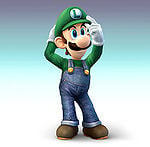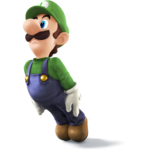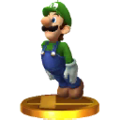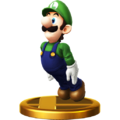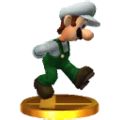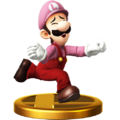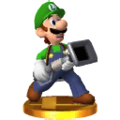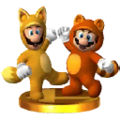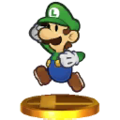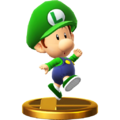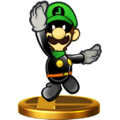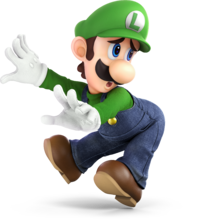Luigi
- For fighter info, see Luigi (SSB), Luigi (SSBM), Luigi (SSBB), Luigi (SSB4), and Luigi (SSBU).
| Luigi | |
|---|---|
File:Luigi MP10.png
Official artwork of Luigi from Mario Party 10. | |
| Universe | Mario |
| Debut | Mario Bros. (1983) |
| Smash Bros. appearances | SSB Melee Brawl SSB4 Ultimate |
| Most recent non-Smash appearance | WarioWare Gold (2018) |
| Console/platform of origin | Game and Watch |
| Species | Human |
| Gender | Male |
| Place of origin | Mushroom Kingdom |
| Created by | Shigeru Miyamoto |
| Voice actor | Charles Martinet |
| Article on Super Mario Wiki | Luigi |
Luigi (ルイージ, Luigi) is a major character in the Mario series, and Mario's younger twin brother. Originally an exact copy of Mario, and soon thereafter a palette swap, Luigi's appearance and personality have developed greatly since then, to the point that he has become the co-star and deuteragonist of their home series.[1]
As a member of the "perfect-attendance crew", Luigi has been featured as a playable character throughout the Super Smash Bros. series.
Character description
Two years after the widely acclaimed classic Donkey Kong, Shigeru Miyamoto wished to incorporate the two-player competitive and cooperative gameplay of the arcade game Joust into his own game. To this end, he created Mario's twin brother for the arcade game Mario Bros. However, Luigi's technical debut was in the otherwise unrelated Game & Watch title of the same name.[2] Luigi's name is said to have been inspired by a pizza parlor called "Mario & Luigi's", which was located near Nintendo of America's headquarters.[3] Coincidentally, his name was also noted to be similar to the Japanese word 「類似」 (ruiji), which means "similar" and further ties into his formative years as a palette swap.[4]
Luigi's design, both in official artwork and gameplay, was a palette swap of Mario; in this case, his overalls and shirt are green and black, respectively, to contrast with Mario's red and blue.[5] While the Game & Watch version of the game has one player control both brothers, the arcade version features Luigi as the character that the second player would control.[5]
Luigi would then be featured in the widely acclaimed classic Super Mario Bros. for the NES, which saw the brothers travel through the Mushroom Kingdom for the first time to rescue Princess Toadstool from the evil Koopa King, Bowser. Unlike its predecessor, Super Mario Bros. features Luigi clad in a green shirt, white overalls and white hat, which would become his color scheme as Fire Luigi in subsequent games. This game also notably, albeit quietly, retconned his and Mario's depiction as Italian-American plumbers from New York City.[6]
In Super Mario Bros.: The Lost Levels/Super Mario Bros. 2, Luigi was established as having superior jumping prowess compared to Mario, but having worse traction. Super Mario Bros. 2 also established that Luigi was both taller and thinner than his brother. All of these traits would become Luigi's defining gameplay and physical traits in the overwhelming majority of subsequent games.
Although Mario effectively became Nintendo's mascot thanks to the success of Donkey Kong and Super Mario Bros., Luigi's relevance waned in response, so much so that he was actually left out of some games entirely. While he appeared as the solo playable character in Mario is Missing!, this game was an edutainment-based spin-off instead of a part of the main Mario games. The most notable instance of Luigi's dwindling relevance was his complete absence in the widely acclaimed classic Super Mario 64, which was marked with many different rumors claiming he was an unlockable character. Despite this, he would appear in the Nintendo DS remake of Super Mario 64 as a playable character alongside Yoshi and Wario.
After these absences, Luigi saw increased attention when he was included in Super Smash Bros. In addition to gaining an evil counterpart named Waluigi in Mario Tennis, it was Luigi's Mansion, which notably marked both his first starring role in a main Mario game and Luigi's personality actually undergoing development, that finally broke him out of his years-long slump and reestablished his role in the Mario franchise, and he eventually gained his own love interest in Princess Daisy since Mario Golf. Although Luigi did not appear in Super Mario Sunshine, Nintendo has nevertheless made a more conscious effort to include him in more games, playable or otherwise. This has been most obvious with his co-starring role in Mario & Luigi series alongside Mario, as well as his status as a party member in Super Paper Mario and his appearance as a playable character in Super Mario Galaxy and Super Mario Galaxy 2.
However, Luigi's relevance increased considerably thanks to the announcement of the Year of Luigi, which was announced on February 14, 2013 and commemorated the 30th anniversary of his debut.[7] Various games and collectables focusing on Luigi were released, with two of the games, Luigi's Mansion: Dark Moon and Mario & Luigi: Dream Team, further developing his character. Dark Moon saw him develop a slightly more courageous attitude, save Mario yet again, and resulted in King Boo becoming his full-fledged archenemy, drawing parallels to Mario and Bowser's rivalry. Dream Team further cemented the deep bond between the Mario Bros. and saw Luigi courageously rise to the occasion against Bowser, which resulted in his critics, such as Starlow, coming to view him as Mario's equal.
Aside from his character development, Luigi's abilities were also highlighted during the Year of Luigi. New Super Luigi U notably lacked Mario and instead focused on Luigi's unique traits, such as his slippery traction and high jumps. Dr. Luigi marked his debut as a doctor like his brother before him, and saw him utilize unique L-shaped Megavitamins. Although the Year of Luigi officially concluded on March 18, 2014,[8] one final Year of Luigi game, Super Luigi Bros., was released a little over a month later as a part of NES Remix 2. Like Super Mario 3D World's Luigi Bros., Super Luigi Bros. is a modified emulation of Super Mario Bros., but noticeably differs by retaining Luigi's higher jumps and sporting mirrored versions of every level.
In Super Smash Bros.
Luigi's first appearance in a fighting game is in Super Smash Bros., where he appears as one of the four unlockable characters. His design is based on his appearance in Mario Kart 64, albeit with his overalls colored indigo instead of blue. His voice clips are a higher pitched version of Mario's voice clips from Super Mario 64. Luigi can be unlocked after completing the Target Test with all of the starter characters.
Luigi's abilities are almost identical to Mario's, although there are a few differences between them. His neutral special move is also a Fireball, albeit colored green and immune to gravity. Luigi's up special move is also the Super Jump Punch, but his is very polarized compared to Mario's. Due to consisting of a sweetspot and a sourspot, Luigi's version can deal up to 25% when landing the former, but only 1% when landing the latter. Lastly, his down special move is the Luigi Cyclone: it is is similar to the Mario Tornado, but instead consists of only two hits and that each launch the opponent away from Luigi. In addition, Luigi is notably the only character in the game whose taunt can damage opponents.
Largely because of his awkward physics, Luigi is currently ranked 12th on the tier list. This places him in the C tier and at the bottom of the list.
Luigi's in-game character description reads:
- Luigi
- Though often hidden in his older brother Mario's shadow, Luigi, is in reality, very popular. Taller than Mario, Luigi also jumps higher. Although he didn't appear in Super Mario 64, in Mario Kart 64 he performed to the best of his ability. For one who always seems to be in the background, he has many fans who eagerly await his appearance.
- Works:
- Mario Bros (NES)
- Super Mario Bros. 2 (NES)
- Mario Kart 64 (N64)
In Super Smash Bros. Melee
Luigi appears in Super Smash Bros. Melee as a secret character. Luigi can be unlocked in Adventure Mode via two methods. One is by finishing the first stage with the number 2 in the timer; in addition to causing him to take Mario's place in the subsequent battle, is may also be a reference to Luigi having always been considered second to his older brother. The second method is by playing 800 VS matches.
Like his fellow veterans, Luigi now has a side special move; in his case, it is Green Missile. Green Missile propels Luigi forward and can be charged. In addition to being usable for recovery like Super Jump Punch, Green Missile can potentially misfire, which significantly increases its damage output and travel distance.
Due to Luigi's moveset and mobility being noticeably improved, as well as benefiting from Melee's game physics, Luigi is currently ranked 13th on the tier list. This places him in the D tier and directly in middle of the list.
Trophies
As a playable character, Luigi is featured on three trophies - his normal trophy, acquired by beating Classic mode with Luigi on any difficulty, and "Smash Red" and "Smash Blue" trophies won by beating Adventure and All-Star modes, respectively - as well as a fourth, styled after his appearance in the GameCube launch title Luigi's Mansion.
His normal and "Vacuum Luigi" trophies read as follows:
Luigi
Although Mario's younger brother has always played second fiddle, Luigi finally garnered the spotlight with his very own game, Luigi's Mansion. Things are looking up for the eternal understudy; he's even picked up his own rival in Waluigi. The day he's referred to as the "lean, mean, green machine" may not be too far off.
- Mario Bros, Arcade 1983
Vacuum Luigi
In a strange twist of fate, Luigi wins a huge mansion in a contest he didn't even enter, and the place turns out to be haunted! After meeting a weird professor named Elvin Gadd, Luigi enters the place armed with a flashlight and a ghost-sucking vacuum cleaner. Mario's trapped somewhere in there! Can Luigi save him?
- Luigi's Mansion, 11/01 (GameCube)
In Super Smash Bros. Brawl
Luigi appears in Super Smash Bros. Brawl as an unlockable character and can be unlocked by playing 22 VS matches, completing Classic Mode, or by having him join the party in Adventure Mode: The Subspace Emissary. Unlike in SSB and Melee, Luigi's design is now based on his appearance as of Luigi's Mansion, albeit with a subdued and realistic aesthetic. By extension, he now has his own unique voice clips, instead of using sped up versions of Mario's voice clips.
Like his fellow veterans, Luigi now has a Final Smash; in his case, it is Negative Zone. Despite having been buffed overall, particularly to his recovery, the loss of wavedashing significantly harmed Luigi. As a result, he is currently ranked 28th on the tier list, placing him in the E tier.
Trophies
Luigi has a trophy that is awarded each time Classic Mode is completed with Luigi on any difficulty. See Negative Zone for the trophy description of Luigi's Final Smash.
- Luigi
- Mario's younger twin brother. He's shy and quiet and overshadowed by his sibling, but he's actually quite talented. His jumping ability surpasses Mario's, and his all-around skills let him overcome any problem. He's a bit cowardly and really afraid of ghosts. Even so, in Luigi's Mansion, he was charged with cleaning up a whole house full of spirits.
: Mario Bros
: Luigi's Mansion
- Paper Luigi
- The legendary hero Mario's younger brother. He's teased by Koopas and Goombas alike and is sometimes called "green mustache guy." He goes missing after Bowser and Peach's wedding. He's known for his jumping prowess—his special move is the High Jump. It's said that he has a close relationship to the masked man brainwashed by Count Bleck and known only as "Mister L."
: Super Paper Mario
Stickers
| Name | Game | Effect | Character(s) |
|---|---|---|---|
| Luigi | Luigi's Mansion | ||
| Luigi | Mario & Luigi: Superstar Saga | ||
| Luigi | Super Paper Mario | ||
| Luigi & Baby Luigi | Mario & Luigi: Partners in Time | ||
| Mario & Luigi | Mario & Luigi: Superstar Saga |
 Luigi (Luigi's Mansion) |
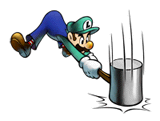 Luigi (Mario & Luigi SS) |
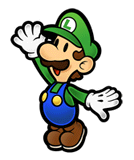 Luigi (Super Paper Mario) |
Luigi & Baby Luigi (Mario & Luigi: PiT) |
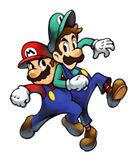 Mario & Luigi (Mario & Luigi SS) |
In Super Smash Bros. 4
Luigi appears in Super Smash Bros. 4 as a playable character. However, SSB4 is the first installment of the series to announce him as a playable character before release and, unlike in the previous three installments, he is now a starter character. Like Mario, Luigi's design is based off his appearance as of Super Mario 3D Land.
Luigi has been buffed in the transition from Brawl to SSB4. In addition to retaining his overall fast attack speed and varied recovery, Luigi's moveset now boasts an impressive amount of utility, particularly in regard to combo potential. This is best demonstrated by Luigi's grab game, which is among the best in the game thanks to his quick grabs, his back throw being a viable KOing option, and his down throw possessing outstanding combo potential.
However, Luigi retains his slow mobility, especially while airborne, as well as his extremely low traction. Update 1.1.1 also altered the knockback of his down throw, which removed its guaranteed KO set-ups.
Despite his flaws, Luigi overall remains a force to be reckoned with, and he has achieved fairly strong tournament representation and results throughout SSB4's lifespan. As a result, he is currently ranked 18th on the tier list, placing him in the B tier.
Trophies
Luigi
 Luigi recently celebrated his 30th anniversary with the Year of Luigi, but all that attention just made him even more shy and awkward. In Smash Bros., Luigi takes a lot of cues from his brother in fighting style, adding flair to moves like Super Jump Punch. His taunts, however, are truly unique.
Luigi recently celebrated his 30th anniversary with the Year of Luigi, but all that attention just made him even more shy and awkward. In Smash Bros., Luigi takes a lot of cues from his brother in fighting style, adding flair to moves like Super Jump Punch. His taunts, however, are truly unique. Luigi recently celebrated his 30th anniversary with the Year of Luigi, but all that attention just made him even more shy and awkward. In Smash Bros. (as in life), Luigi tends to follow his brother's lead, but he adds his own flair to moves like Super Jump Punch. His taunts, however, are 100% Weegee.
Luigi recently celebrated his 30th anniversary with the Year of Luigi, but all that attention just made him even more shy and awkward. In Smash Bros. (as in life), Luigi tends to follow his brother's lead, but he adds his own flair to moves like Super Jump Punch. His taunts, however, are 100% Weegee.With the Year of Luigi long gone now, it's up to you to prove to everyone that Mario's cowardly co-star is still awesome. He may share a lot of moves with his brother, but he still puts his own spin on things. When you Super Jump Punch a foe just right, for example, the noise he makes is epic. His taunts are pretty funny too. Try them!
- Appears In
- Mario Bros. 1983
: Luigi's Mansion: Dark Moon 03/2013
Luigi (Alt.)
Luigi may sulk when his down taunt is used, but his little dejected kick can actually hurt a nearby enemy fighter. It can even trigger a meteor smash! Notice an enemy leisurely hanging from the edge? Run over and pout on the edge—that foe will be the one with something to pout about!
Luigi might look a bit sulky when you use his down taunt, but when he does it next to another fighter, it can get in a little hit - well, a "little hit" that can also sometimes be a meteor smash! Say you spot a fighter hanging off the edge of the stage. Just give them a pout and a kick with this taunt, and they'll fall to their doom.
- Appears In
- Mario Bros. 1983
: Luigi's Mansion: Dark Moon 03/2013
Luigi (With Poltergust 3000)
Luigi (With Poltergust 5000)
Luigi's trusty tool, the Poltergust 3000. This isn't your neighbor's boring, old vacuum—the Poltergust 3000 sucks up ghosts! It also can find them when they are hiding and can blow them around a room! Why doesn't every family own one of these, I wonder...
Unlike your run-of-the-mill vacuum cleaner, this one sucks up...ghosts! And it doesn't just suck them up - it blows them around, draws them to you, and even helps you find them when they're hidden. Talk about convenient! No home should be without one. No Luigi should be without one, either.
Tanooki Mario & Kitsune Luigi
If you find a Super Leaf, Mario transforms into Tanooki Mario! His newfound tail works as a weapon and as a propeller to slow his fall. His brother, Luigi, won't turn into a Tanooki, though—he becomes Kitsune Luigi. Wouldn't want to have trouble telling the two apart, would we?
When Mario uses a Super Leaf, he grows a tail and turns into Tanooki Mario, a very handy form indeed. Likewise, Luigi turns into Kitsune Luigi. Both of them can swing their tails to attack enemies, or wag their tails to slowly float down after a jump, almost like they're walking on air.
Paper Luigi
Paper Luigi is Paper Mario's younger brother. He shows up from time to time during Paper Mario's quest for the Royal Stickers, but he doesn't stick around for long. Such a modest guy... I wonder what he's getting up to now!
Paper Mario's little brother, Paper Luigi. While Mario is searching for the Royal Stickers, you might see Luigi here and there, just lounging around in the background. If you try to peel him away like a sticker, he runs off quick as a flash. What on earth are you playing at, Luigi?
Baby Luigi
Despite missing the trademark mustache, the big nose and the L on his cap should be dead giveaways that this is Luigi! When he appeared in Mario Kart: Double Dash!!, Baby Luigi surprised the other racers with his Rattle Buggy driving skills. Adult Luigi probably still remembers those days of racing glory.
Since he's only a baby, he doesn't have the trademark moustache yet, but that big L on his cap and his even bigger nose make him unmistakably Luigi. In Mario Kart: Double Dash!!, his first playable outing, he zooms around the tracks in his Rattle Buggy. Do you think grown-up Luigi remembers all those escapades?
: Super Mario World 2: Yoshi's Island 10/1995
: Yoshi's New Island 03/2014
Mr. L
- He calls himself the Green Thunder, but Mr. L's true identity is a mystery, forever concealed beneath his stylish green hat. With his incredible skill of jumping really high, he makes a valuable addition to Count Bleck's evil forces. Coincidentally, for the whole of Mr. L's reign of terror, Luigi is nowhere to be seen. How odd...
: Super Paper Mario 04/2007
In Super Smash Bros. Ultimate
Luigi returns as a character in Super Smash Bros. Ultimate. Like many other characters, he is more expressive than he was in Super Smash Bros. 4.
Trivia
- Much like in their home series, Luigi is largely perceived as being in Mario's shadow within the Super Smash Bros. series. Prior to Super Smash Bros. 4, Luigi had been an unlockable character, whereas Mario has consistently been a starter character. In Super Smash Bros., the notice for unlocking Luigi described him as "The Eternal Understudy". In Super Smash Bros. Melee, one method to unlock Luigi is by clearing the first level (Mushroom Kingdom) in Adventure Mode with the timer set to the number 2 in the seconds area. (XX:X2:XX), which results in him being fought on Mushroom Kingdom II. In Super Smash Bros. Brawl, one of the ways to unlock Luigi is to play exactly 22 versus matches; additionally, Snake's Codec Conversation sees the Colonel describe Luigi as the "King of Second Bananas". His Boxing Ring character title in SSB4 is "The Eternal Understudy", which continues his "second hand" theme and is a direct reference to his notice in SSB.
- Luigi and Jigglypuff are the only characters to appear in SSB, Melee, and Brawl as unlockable characters.
- Despite being able to wall jump in all but one Mario game, Luigi has been unable to do so in any Super Smash Bros. game.
- However, he was able to wall jump in the early E3 build of Super Smash Bros. for Nintendo 3DS.
- In SSB, Luigi has no unique sound effects whatsoever, despite having his own distinct voice beginning with Mario Kart 64, which was released before SSB. Instead, his voice clips and sound effects are simply higher-pitched versions of Mario's voice clips from Super Mario 64, while Luigi Cyclone's voice clip and sound effect are directly copied from Mario Tornado. In Melee, Luigi received only one unique sound effect: the spring sound effect from Super Mario World for his planking victory pose. However, this trend ended in Brawl, where Luigi received his own unique voice clips and sound effects.
- Luigi has always been portrayed as being a slower runner than Mario in the Super Smash Bros. series. However, aside from certain games such as the Mario & Luigi series, Mario is generally the slower of the two.
- Similarly, from Melee onward, Mario has been portrayed as being slightly weaker than Luigi. However, the Mario series has generally Luigi being slightly weaker than Mario.
- Due to appearing in Luigi's Mansion, a launch title for the Nintendo GameCube, Luigi is the only character in Melee to appear as a playable character on the Nintendo GameCube before Melee’s release.
- Luigi's floaty nature in the Super Smash Bros. series is similar to his physics in Super Mario Bros. 2. Those physics are also featured in later Mario games.
References
- ^ Luigi called the deuteragonist of Mario franchise. IGN. Retrieved July 31, 2017.
- ^ Mario Bros. info page on In The Attic, a website dedicated to classic video games
- ^ Mario Bros. at The International Arcade Museum
- ^ Super Mario: The New Craze in Japan
- ^ a b IGN Presents The History of Super Mario Bros.
- ^ "Q&A: 'Mario' creator Shigeru Miyamoto".
- ^ Nintendo Direct 2.14.2013
- ^ Shigeru Miyamoto's Miiverse post announcing the end of the Year of Luigi
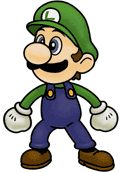
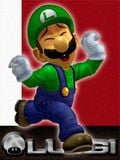

![Smash [Adventure Mode] trophy](https://ssb.wiki.gallery/images/thumb/b/bb/Luigi_Trophy_%28Smash%29.png/69px-Luigi_Trophy_%28Smash%29.png)
![Smash [All-Star Mode] trophy](https://ssb.wiki.gallery/images/thumb/6/66/Luigi_Trophy_%28Smash_2%29.png/73px-Luigi_Trophy_%28Smash_2%29.png)

